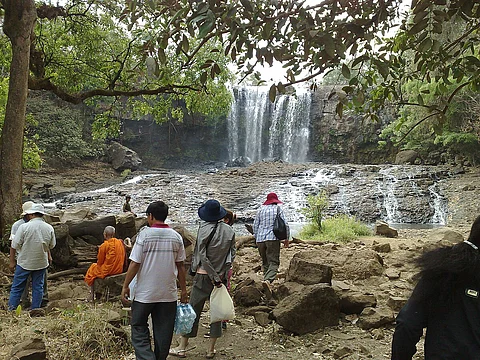
- Destinations
- Experiences
- Stay
- What's new
- Celebrating People
- Responsible Tourism
- CampaignsCampaigns
- SubscribeSubscribe
- Buy Now

Stretching across Cambodia’s eastern frontier, Mondulkiri stands out as the country’s largest yet most sparsely populated province. Known as the “center of mountains” in Khmer, this vast region is defined by its rugged hills, dense forests, and cascading waterfalls. Bordering Vietnam to the east and south, and flanked by several other provinces, Mondulkiri’s capital, Sen Monorom, serves as a gateway to its largely untouched wilderness.
Despite its remote location and low population density, Mondulkiri holds significant ecological value. It is home to key protected areas like the Phnom Prich and Srepok Wildlife Sanctuaries, which shelter a diverse range of wildlife. Covering some 4,300 sq km, the Mondulkiri Protected Forest is recognized by the WWF as one of Asia’s last major wildernesses. Sometimes called “the Serengeti of Asia,” this region is also a leading candidate for tiger reintroduction initiatives.
However, Mondulkiri’s forests face ongoing threats from illegal logging, which targets its virgin tropical seasonal forests and poses risks to the province’s ecological balance.
Demographically, the province is home to a diverse population, with about 80 per cent belonging to ten different indigenous tribal groups. The Bunong—also spelled Phnong, Punong, or Pnong—make up the majority among these communities. The remaining 20 per cent consists of Khmer, Chinese, and Cham Muslim residents, reflecting the province’s cultural mix.
Mondulkiri Province in Cambodia offers ethical and nature-focused tourism experiences. Visitors can explore the jungle, engage with the local Bunong community, and participate in community-based tourism that supports local livelihoods.
Explore the forests of Mondulkiri alongside the Bunong people, the largest indigenous group in Cambodia’s highlands. Known for their strong bond with nature, the Bunong offer guided treks through dense rainforests where you can spot diverse wildlife, discover hidden waterfalls, and learn about the local ecosystem and traditional forest practices.
Mondulkiri is home to several stunning waterfalls, including Bou Sra, Dak Dam, and Pu Long. Visitors can enjoy hiking trails that lead to these natural sights, often as part of eco-friendly tours or community-based projects that support local livelihoods and conservation efforts.
The province is also known for its ethical elephant sanctuaries. Seek out sanctuaries like the Elephant Valley Project and Mondulkiri Elephant & Wildlife Sanctuary that prioritize elephant welfare and rehabilitation. Avoid riding elephants, as it harms the animals and is unethical. Support responsible tourism by choosing locally owned tours and accommodations committed to sustainable practices, ensuring your visit benefits both the elephants and the local communities. At places like Mondulkiri Elephant & Wildlife Sanctuary (LEAF Cambodia), Elephant Valley Project, and Elephant Community Project, tourists can observe, feed, and learn about rescued and rehabilitated elephants in their natural habitat. These initiatives prioritize animal welfare while providing meaningful, responsible visitor experiences.
In Mondulkiri, visitors have the opportunity to immerse themselves in the culture of the indigenous Bunong people. By visiting Bunong villages, travelers can learn about traditional lifestyles and participate in hands-on activities such as craft-making and cooking classes. These experiences offer a deeper understanding of the community’s customs and daily life. Additionally, several community-based tourism initiatives provide tours that directly benefit local residents.
Mondulkiri Province offers a diverse range of stays, catering to travelers seeking everything from peaceful nature retreats to resorts with modern amenities.
KNN Resort Mondulkiri offers a variety of accommodation types, including cozy bungalows and standard rooms. Guests can enjoy facilities such as a stunning infinity pool overlooking the hills, a fully equipped gym, and a restaurant serving local and international cuisine. The resort’s elevated position provides panoramic views, perfect for relaxation and photography.
Address: Resort Mondulkiri, Krong Saen Monourom 110501, Cambodia
Located in the heart of Sen Monorom, Mayura Hill Resort features spacious villas with modern amenities. The resort boasts an inviting infinity pool, a fitness center, and a casual restaurant serving fresh local dishes. Its convenient location and upscale facilities make it suitable for travelers seeking comfort with easy access to town attractions.
Address: National Road, Phum Derm Srol, Sangkat 7, Krong Saen Monourom, Cambodia
Pida Coffee Farm Lodge is set on an operational coffee farm and offers a rustic, authentic experience close to nature. The accommodations are simple but comfortable, allowing guests to immerse themselves in the rural lifestyle. This lodge is ideal for travelers interested in learning about coffee cultivation while enjoying peaceful forest surroundings.
Address: Krong Saen Monourom, Cambodia
Nature Lodge features rustic wooden bungalows and cottages surrounded by dense forest. Popular among nature lovers, it offers quietude and scenic views. The on-site woodsy café provides a cozy spot to relax with a drink or snack after a day exploring the wilderness.
Address: Nature Lodge Road, Chomka Tai village, Krong Saen Monourom 110101, Cambodia
Breathe Wild Project focuses on protecting Mondulkiri's natural treasures and supporting sustainable development. They offer a tranquil retreat surrounded by nature, with opportunities for guests to participate in reforestation efforts and learn about indigenous plants.
Address: National Road, Pech Chreada Bousra Village, Sen Monorom, 110404, Cambodia
The closest airport to Mondulkiri is Phnom Penh International Airport (PNH), which is about 373 km away by air and 367 km by road. There is no railway station directly in Mondulkiri. The closest major railway station is in Phnom Penh. The drive from Phnom Penh to Mondulkiri takes approximately 5h 16m to 5h 24m.
The best time to visit Mondulkiri is from October to February. This period offers pleasant weather with manageable humidity, making it ideal for outdoor activities like hiking and exploring the waterfalls and forests.
Indian citizens need a visa to enter Cambodia, available as an e-visa or on arrival at major airports and land borders. Both options are valid for 30 days. The e-visa is applied online for convenience, while visa on arrival offers easy processing. A passport with six months’ validity, a return ticket, and proof of funds are typically required.
